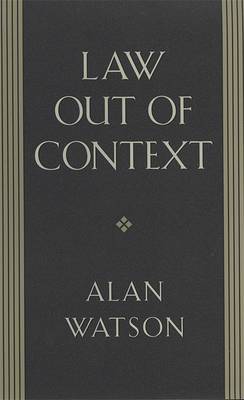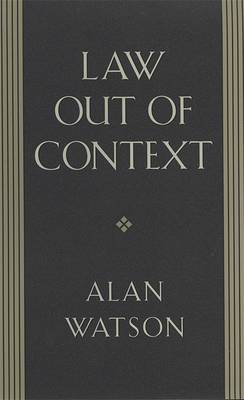
- Afhalen na 1 uur in een winkel met voorraad
- Gratis thuislevering in België vanaf € 30
- Ruim aanbod met 7 miljoen producten
- Afhalen na 1 uur in een winkel met voorraad
- Gratis thuislevering in België vanaf € 30
- Ruim aanbod met 7 miljoen producten
Zoeken
Omschrijving
Law and society are closely related, though the relationship between the two is both complicated and understudied. In a world of rapidly changing people, places, and ideas, law is frequently taken out of context, often with surprising and unnecessary consequences. As societies and their structures, religious doctrines, and economies change, laws previously established often remain unchanged. Dominant nations frequently impose their own laws on weaker nations, whether or not their cultures are similar. Conquered nations, after regaining freedom, often keep their conquerors' laws by default. Law is often misrepresented in literature, and legal scholars, citizens, and businesspeople alike ignore large portions of the legislation under which they live and work. Even the American system of legal education frequently proves itself irrelevant to a proper understanding of today's laws. Alan Watson studies examples from the ancient laws of Rome and Byzantium, laws within the Christian Gospels, and policies of legal education in the modern United States to demonstrate the need for a new approach to both law and legal education. Law Out of Context illustrates that only by understanding comparative legal history and by paying more attention to changes in our society can we hope to devise consistently fair and respected laws.
Specificaties
Betrokkenen
- Auteur(s):
- Uitgeverij:
Inhoud
- Aantal bladzijden:
- 232
- Taal:
- Engels
Eigenschappen
- Productcode (EAN):
- 9780820341163
- Verschijningsdatum:
- 1/11/2012
- Uitvoering:
- Paperback
- Formaat:
- Trade paperback (VS)
- Afmetingen:
- 152 mm x 229 mm
- Gewicht:
- 285 g

Alleen bij Standaard Boekhandel
+ 100 punten op je klantenkaart van Standaard Boekhandel
Beoordelingen
We publiceren alleen reviews die voldoen aan de voorwaarden voor reviews. Bekijk onze voorwaarden voor reviews.











